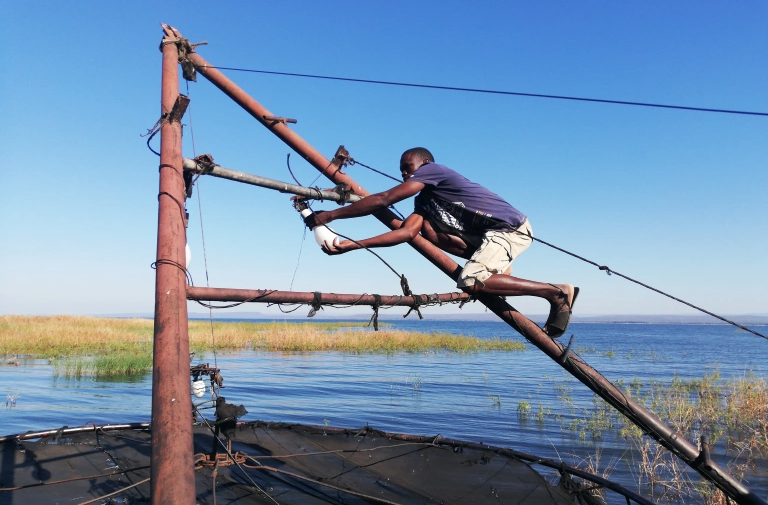Binga – BaTonga tribe traditionally made their living fishing along the Zambezi River and Lake Kariba. But expensive permits and national fishing industry regulations are impeding their way of life.
It is mid-morning in Zimbabwe’s Binga district, on the shores of the Zambezi River, and the sun is already scorching.
Takuchinchi Munsaka of BaTonga tribe services the diesel-powered engine of his fishing rig – a boat made up of cylindrical metal at the base, which allows it to float, and energy-saving lightbulbs at the top which help attract kapenta when the fisherman goes out at night.
Strong river torrents move to and from the shore, almost threatening to carry the boats away on this mighty river sandwiched between Zimbabwe and Zambia, while the loud engines of surrounding rigs whine and rattle – drowning out conversations between fishermen on nearby boats.
When night falls, Munsaka, 31, will sail his rig out across the river, lower his black nets into the water below, and fish – kulabula as it is called in his local Tonga language.
ALSO READ | ‘The regime is panicking,’ says Zimbabwe’s MDC after police arrest 19 at pre-election protest
Fishing has been a part of his community for generations. But in recent years, it has become increasingly difficult for many to make it out onto the river at all. The reason: fishing permits.
A fishing permit is a legally mandated licence, renewable every three or 12 months, that commercial fishermen are required to have to fish in the Zambezi River. Issued by the Zimbabwe Parks and Wildlife Management Authority (ZimParks), a state agency responsible for wildlife conservation in the country, the permits were introduced in 1990 in a bid to regulate the number of fishers, thus preventing overfishing and aiding conservation.
Those caught fishing without a licence can be fined $2,000 and have their boat impounded.
But the relatively high cost – $1,200 for a yearly permit, plus thousands of dollars to build a fishing rig that meets government regulations – and the limited number of permits handed out each year, has disproportionately benefitted wealthy fishers from the cities at the expense of communities like BaTonga, locals say.
‘I had to survive’
Munsaka, who is a father of two, lives in Muyobe village, a remote rural community some 50 kilometres from Binga Centre, the financial hub of the district of about 139,000 people.
A tall man of medium build, he has spent much of his life working on the river. He started young, fighting his way into the fishing industry as a boy, he says.
“When I reached teenage years, I started buying kapenta from fishermen from the city. I walked for nearly five kilometres up the hills from the Zambezi River to Binga Centre with about 30kg of kapenta, on my back. This was for resale to the locals,” he recounts.
Follow African Insider on Facebook, Twitter and Instagram
Source: AFP
Picture: AFP
For more African news, visit Africaninsider.com


